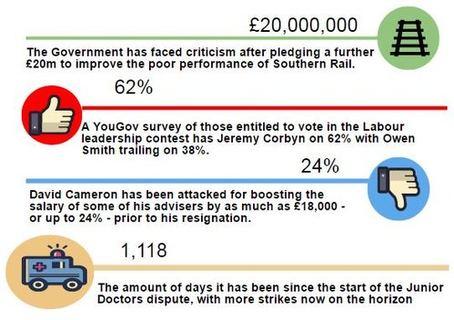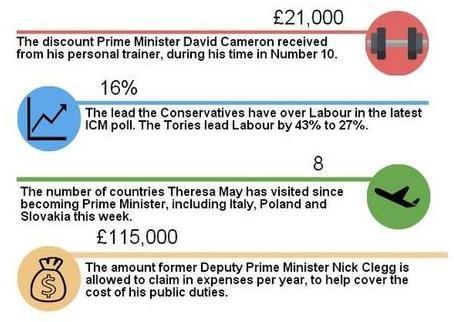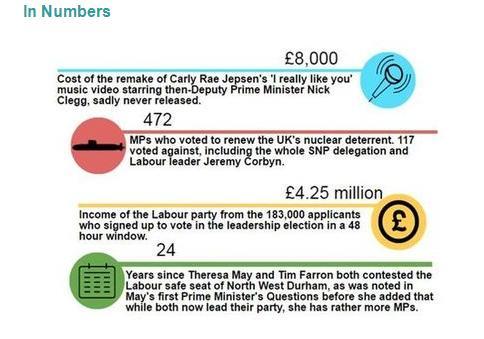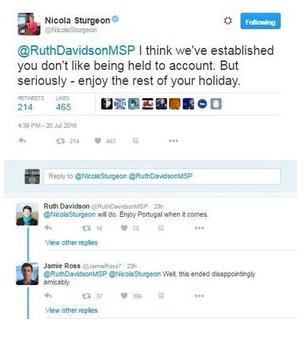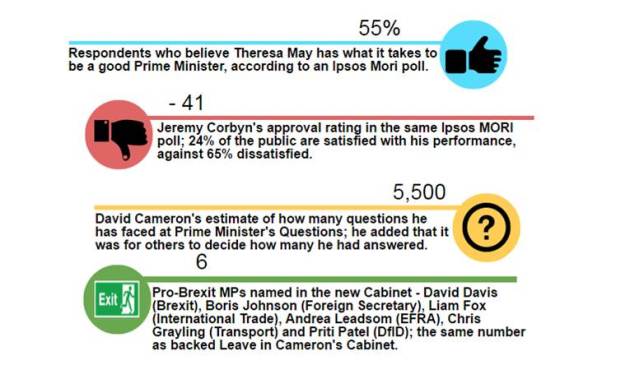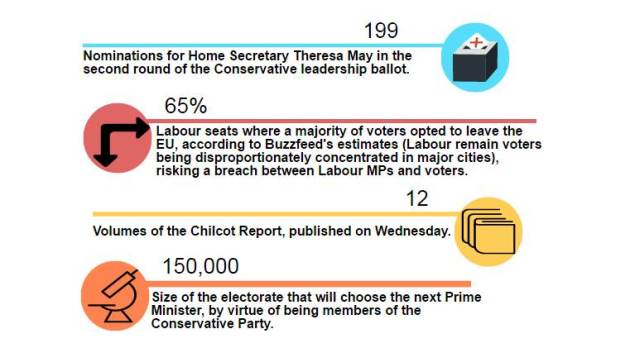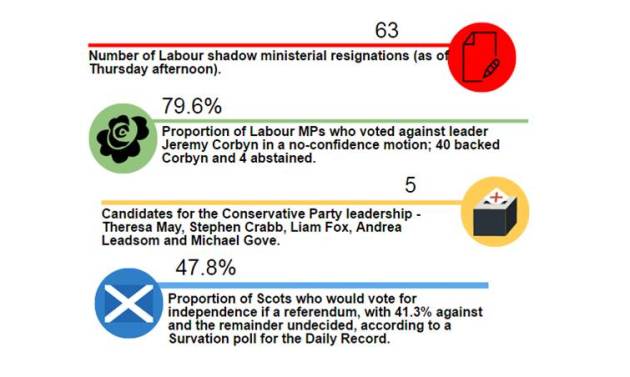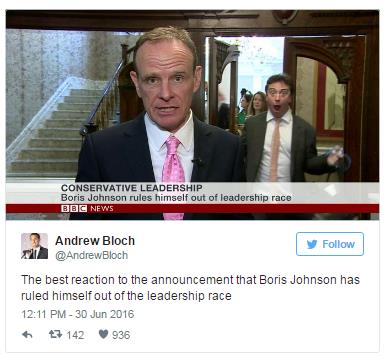What the parties said
Theresa May returned from the G20 Summit after the weekend, where she received a lukewarm reception from world leaders. Headlines were dominated with President Obama’s decision to stand form on warnings the UK would be at the back of the queue on agreeing free trade deals. Speaking in the Commons later in the week, she made clear the Government would not be providing a ‘running commentary’ on its negotiation strategy or position on Brexit. After a Civil Service leak earlier this week, May announced the re-introduction of grammar schools, which will be required to take a proportion of pupils from lower-income households or establish a new non-selective free school. The policy is expected to be a central pillar of May’s social reform agenda. The divisive proposals have already met opposition from MPs across the house and those within the industry.
Labour leader Jeremy Corbyn suggested he did not think the UK needed to remain a member of the single market following Brexit, but rather should look to maintain ‘access’. His comments conflicted directly with the line adopted by Shadow Chancellor John McDonnell, who has consistently warned about the ‘substantial’ damage that could be caused as a result of losing single market membership. His comments also prompted backlash amongst moderate Labour MPs already disillusioned with his leadership.
SNP leader Nicola Sturgeon set out her programme for Government in the Scottish Parliament. Despite not committing to a Scottish Referendum Bill, she said the Scottish Government would ‘consult on a draft bill in case independence is the best or only way to protect Scottish interests’. She placed an emphasis on reforming education and announced plans to unveil a School Governance Report next week and will give more powers to teachers.
What the papers said
Institute for Government has published an interesting interview with Iain Duncan Smith on his experience becoming a government minister. IDS goes through his journey of working out how the Department functions to how he dealt with inheriting a different Shadow Minister’s brief once in Government. The genesis of Universal Credit is explained as well as the Treasury’s decision to ‘kill off’ the idea of transferring tax credit out of the Treasury and into the Department for Work and Pensions. The piece adds colour to what you might already know about IDS in his position as Secretary of State for the Department of Work and Pensions although there are some gaps on the background of some of his more controversial policies.
Elsewhere, The Financial Times this week has had two contrasting pieces about Prime Minister, Theresa May. While other media outlets have led with commentary criticising Theresa May’s lack of plan concerning Brexit, Sebastian Payne has written that we should give May the ‘benefit of the doubt’. Not only that, but Payne says that it is ‘naïve to expect a fully detailed and costed strategy on exactly what the UK wants from Brexit just two months after the vote to leave, and just one month after a change of government.’ Payne expects that we will get further details on Brexit policy at the Conservative Party conference and if May and Secretary of State for Brext, David Davies neglect to do this, then that would be the appropriate time to criticise them.
Meanwhile, another piece in the FT from Chris Giles is more critical. While Giles accepts that that it is understandable that May is still working on the details, he says it is unacceptable for her to dismiss discussion of the choices ahead. He is also critical of her comments that the outcome ‘will work for everyone’ arguing that there always has to be trade-offs in every negotiation. Giles says that May needs to be clear about what the trade-offs will be in Brexit negotiations as by claiming that the resulting Brexit deal will work for everyone, it ‘gives the impression the prime minister does not understand nor care about the losers’ plight.‘
On the benches
MPs Got Talent
Because MPs are clearly not busy enough word has got out that Will Quince MP is to appear on Britain’s Got Talent. Apparently a man with a fine singing voice Quince is doing it for charity.
So far there is no word on whether he will make it through to the TV show. But we would be very surprised indeed if we did not see Mr. Quince on our TV screens on Britain’s Got talent in the near future. This got us thinking about a future feature for the Intelex Weekly Briefing – Surprising Parliamentarian Talent of the Week. Perhaps allotment growing with Jeremy Corbyn, or horse riding with ex-jockey Guy Opperman?
Green Party talk nonsense
The wildly inaccurate on-screen subtitles displayed at the Green Party conference caused much amusement amongst attendees. Brexiteers were ‘those who voted Lee in the referendum’ and party members were told that ‘a progressive alliance will not be tucked down’, rather than ‘top down’. Other phrases were ‘the common ponds of humanity’ and ‘no nuclear, no mice’. Who said environmentalists had no sense of humour?
Nation under survation
Pity the social media wiz in charge of Owen Smith’s campaign who tweeted a photo of Smith rousing support at a meeting last weekend. While no doubt looking every bit the dynamic challenger to Corbyn, the tweet also displayed to the world the login details of Smith’s campaign phone bank system.
Reaction was split between outrage over the hypocrisy of Smith’s repeated attacks on his rival’s incompetency and his somewhat bizarre choice as ‘survation’ as password, which is also the name of a polling company. Tin foil hats at the ready…
Good week/Bad week
Good week for: Sadiq Khan. Labour hasn’t had much to smile about recently, however, this week, London Mayor Sadiq Khan was named as the Evening Standard’s most influential Londoner. Since being elected as Mayor Khan has enjoyed positive approval ratings and, despite Labour woes of late, the party will be thankful for the fact they can point to Khan as a senior Labour figure, in a position of power, who is resonating with voters. All in all it has been a good week for the London Mayor.
Bad week for: Keith Vaz, obviously. An honourable mention must also go to Ken Livingstone, who managed to mention Hitler again in a TV interview, obviously. To add to the outcry there is now a website counting down how many days it’s been since Livingstone has mentioned Hitler. Presumably, this counter is set to automatically reset at the end of each day.
Brexit bites
“The ball is now in your court” – Donald Tusk to Theresa May as they discussed Brexit this week
Nigel Lawson on Brexit in the Financial Times
The European Union Committee and its six sub-committees have this week launched a co-ordinated series of inquiries into the key issues that will arise in the forthcoming negotiations on Brexit.
Short inquiries are being launched on the following topics:
- Brexit: parliamentary scrutiny
- Brexit: UK-Irish relations
- Brexit: Financial Services
- Brexit: future trade between the UK and the EU
- Brexit: fisheries
- Brexit: acquired rights
- Brexit: future UK-EU security and policing co-operation
Tweet of the week
It’s tough being a Labour MP at the moment. Your leader won’t listen to you, your new members want to deselect you and the Conservatives, despite only having a working majority of 17 seem more comfortably ensconced in Government than ever.
Small mercies were provided this week though when Jonathan Reynolds MP won the Westminster Dog of the year competition with Clinton and Kennedy.
This prompted one political researcher to quip ‘Labour have finally won something!’. At least they didn’t make a dogs dinner of this one….







